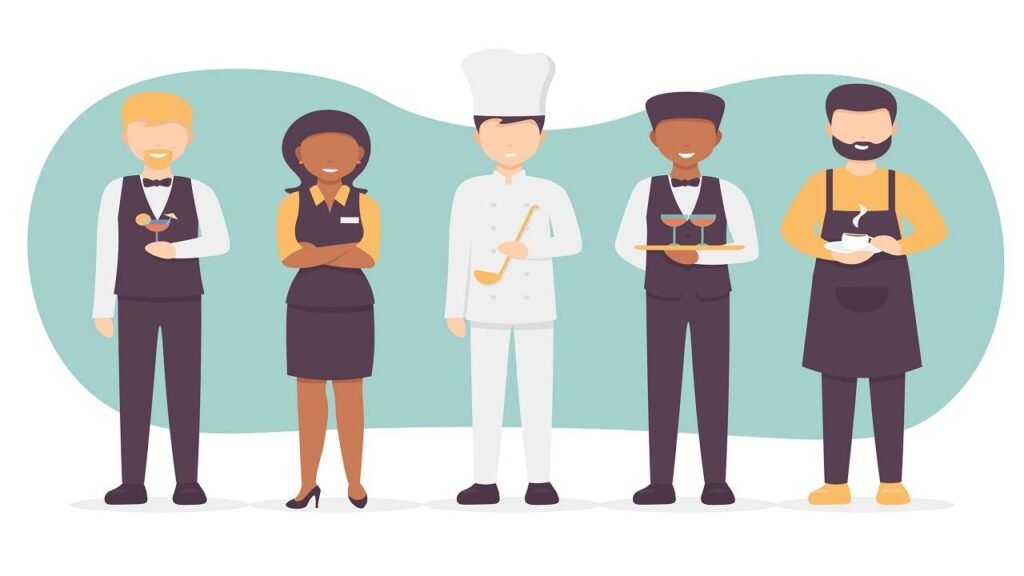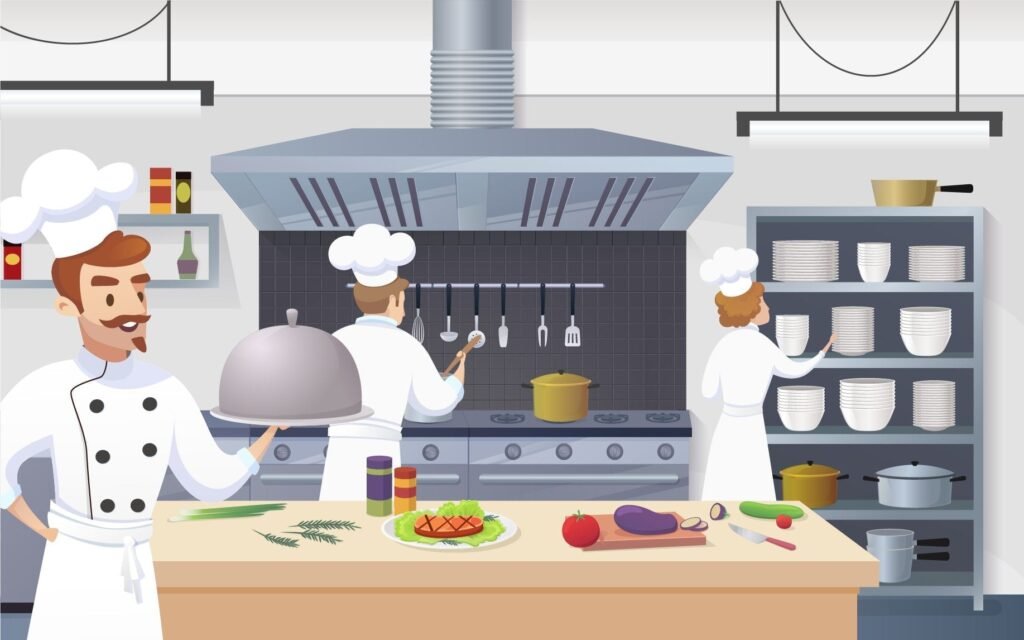How To Become A Chef In 2024 (Guide)
- Author: Eduklass
- Updated: March 15, 2024

Do you find joy in cooking and envision your workplace as the kitchen rather than a cubicle? If so, pursuing a career in culinary arts might be the perfect fit for you.
Culinary art involves the skill of cooking, where culinary artists study recipes and create high-quality dishes. This profession encompasses various aspects such as baking, food preparation, kitchen supervision, and the artful presentation of food on plates. It is an excellent choice for those aspiring to work in the dynamic food and beverage industry, offering opportunities in kitchen management and hotel hospitality.
Professionals in this field are commonly known as culinarians, culinary artists, chefs, or cooks. To excel in this role, one must know about nutrition, culinary science, proper diet, and the art of presenting food attractively.
Notable figures in the world of culinary arts, such as Gordon James Ramsay, Jamie Oliver, Wolfgang Puck, Marco Pierre White, and Sanjeev Kapoor, serve as inspiring examples.
What are the roles and responsibilities of a Chef?
A Chef has several important roles and responsibilities:
- Planning and Supervision: They plan, direct, and oversee the cooking activities in multiple kitchens, like those in restaurants, hospitals, or hotels.
- Presentation: Chefs decide how food should be presented and create attractive displays.
- Cooking Skills: They prepare and cook various types of foods, whether it’s for regular meals or special occasions.
- Creativity: Chefs experiment with recipes and suggest new ingredients to add flavor and variety.
- Quality Control: They check the quality of raw and cooked food to make sure it meets high standards.
- Sanitation: Chefs monitor and enforce sanitation practices to ensure that all employees follow hygiene standards and regulations.
- Supply Management: They estimate the amounts and costs of needed supplies, including food and ingredients.
- Training: Chefs instruct cooks and kitchen staff on how to prepare, cook, garnish, and present food.
- Coordination: They supervise and coordinate the activities of cooks and kitchen workers to ensure smooth operations.
- Inspection: Chefs inspect supplies, equipment, and work areas to make sure everything meets established standards.
- Production Planning: They determine production schedules and staffing requirements to ensure timely service delivery.
- Quality Checks: Chefs check the quantity and quality of received products to maintain high standards.
- Management: They coordinate planning, budgeting, and purchasing for all food operations in places like clubs, hotels, or restaurant chains.
- Pricing: Chefs analyze recipes to set prices for menu items based on food, labor, and overhead costs.
- Supplier Relations: They meet with sales representatives to negotiate prices and order necessary supplies.
- Staffing: Chefs recruit and hire staff, such as cooks and other kitchen workers.
- In summary, a Chef is not just a cook but a multitasking professional responsible for various aspects of food preparation, presentation, and overall kitchen management.
Eligibility to Become a Chef
Ideal candidates for a career as a chef are individuals with a deep passion for food and cooking. Being a chef is not your typical 9-to-5 job; it demands self-motivation, hard work, enthusiasm, and dedication.

Academic Subjects: While there are no strict prerequisites, having prior English study can be advantageous. Proficiency in English is often required for admission exams administered in India.
Qualifications: Candidates should have completed 10+2 or its equivalent from an accredited board with a minimum overall score of 50%.
Age Limit: The National Council for Hotel Management and Catering Technology (NCHMCT) has set an upper age limit for formal education in culinary arts in India. The limit is 25 years for OBC and General categories and 28 years for SC and ST categories.
How To Become A Chef?
To become a chef, you need to work closely with other kitchen team members, such as sous chefs, line cooks, and prep cooks. This collaboration ensures that dishes are prepared on time and meet customer specifications.
Passion and Dedication
Being a chef demands dedication and hard work. While there’s no specific path to follow, there are common steps to pursue a career in this field.
Steps to Become a Chef
- Get a Degree or Diploma
Consider obtaining a degree or diploma from an accredited culinary school. This is highly recommended in today’s competitive restaurant industry. Alongside formal education, online courses like those on Udemy and Skillshare can enhance your skills. - Train and Practice
Hands-on practice is crucial for preparing you for the demands of a professional kitchen. Internships and part-time jobs provide valuable experience that can strengthen your resume. - Find a Job and Gain Experience
After training, seek job opportunities in your desired field, starting with entry-level positions such as Prep Cook or Line Cook. Utilize your professional network to stay updated on job openings. - Develop Your Style
Once employed, shape your skills and develop a unique style, establishing your niche in the culinary world.
Different Types of Chefs

- Commis Chef
A junior Chef is learning from the team. - Bakery Chef
Specializes in baking items like biscuits, cakes, and bread. - Pastry Chef
Independently prepares and presents baked goods and desserts. - Chef de Partie
Works on a specific area in the kitchen, leading a team. - Sous Chef
Second in command, overseeing kitchen operations. - Head Chef
Manages the kitchen team and creates menus. - Executive Chef
Handles the head position, oversees departments, and focuses on culinary innovation.
Is Becoming a Chef a Good Career Choice?
Becoming a chef can be a rewarding career if you have the necessary skills and a passion for cooking. While the profession is competitive and demanding, it offers a fulfilling path for those who enjoy serving through culinary arts.
What Is The Average Chef’s Salary?
The salary of a chef is influenced by several factors, including:
- Level of Education
- Years of Experience
- Geographic Location (State and City)
- Level of Responsibility
According to the 2021 data from the US Bureau of Labor Statistics, experienced chefs earned an average annual salary of $50,150 or $24.11 per hour. Entry-level positions typically offer lower salaries, with the starting salary dependent on your education and experience.
Average salaries can vary based on the restaurant or state. In regions with a higher cost of living, such as New York, California, and Oregon, chefs are generally compensated better compared to equivalent positions in other states.
Let’s explore some of the highest-paying cities in the United States for chefs.
| City | Average Pay (Per Hour) |
| New York, NY | $28.24 per hour |
| Chicago | $23.60 per hour |
| Seattle, WA | $23.37 per hour |
| Los Angeles, CA | $23.16 per hour |
| Atlanta, GA | $21. 37 per hour |
| Denver | $20.17 per hour |
| Brooklyn, NY | $19.87 per hour |
| Pittsburgh, PA | $18.30 per hour |
| Las Vegas, NV | $17.57 per hour |
Let’s have a look at the top 10 states with the highest job growth as a chef.
(Source: US. BLS)
| Sr.No. | State | Average Growth |
| 1 | Utah | 32.2% |
| 2 | Maryland | 23.5% |
| 3 | Texas | 20.7% |
| 4 | Washington | 18.2% |
| 5 | Nevada | 16.9% |
| 6 | Tennessee | 16.9% |
| 7 | Arizona | 16% |
| 8 | California | 16% |
| 9 | Oregon | 16% |
| 10 | Florida | 15.8% |
Essential Skills to Become a Chef
Becoming a chef requires a diverse set of abilities. The following list outlines some crucial skills that a chef should possess:
- Culinary Expertise: A thorough understanding of culinary techniques and skills.
- Comprehensive Ingredient Knowledge: Familiarity with a wide range of ingredients and their characteristics.
- Recipe Development and Menu Creation: The ability to craft recipes and design menus that showcase creativity and appeal.
- Originality & Creativity: The talent to bring original and creative elements to culinary creations.
- Time Management: Efficiently managing time to meet kitchen demands and serve dishes promptly.
- Detail Orientation: Paying attention to details to ensure precision and excellence in every dish.
- Development of Taste and Palate: Cultivating a refined taste and palate to create flavorsome and well-balanced dishes.
- Flexibility: Adaptability to handle various culinary challenges and changes in the kitchen environment.
- Safety of Food and Hygiene: Prioritizing food safety and maintaining high hygiene standards in the kitchen.
Conclusion:
Embarking on a career as a chef is a fantastic decision for individuals with a deep passion for food and cooking.
Achieving success in this field demands dedication and self-motivation. It’s essential to assess your interests, select the right culinary path, and explore diverse courses, such as the Bachelor of Culinary Arts opportunities provided by culinary institutes in India.
From gaining global experiences to expressing creativity, being a chef unlocks doors to a rewarding and fulfilling career. So, if the art of cooking resonates with you, consider pursuing your culinary dreams and start an exciting journey in the captivating world of gastronomy!
Frequently Asked Questions (FAQs) About a Chef’s Career
Is a career as a chef a good option?
Yes, pursuing a career as a chef can be highly rewarding. Mastering culinary skills is crucial for success, and attending a culinary school is an ideal option, although some chefs gain experience through on-the-job training and promotion.
What does an ordinary work week look like?
A typical chef job demands more than fifty hours per week, including weekends, holidays, and late nights. In a restaurant setting, chefs often work 12 to 14 hours a day, seven days a week, which is standard in the industry.
What is the significance of obtaining industry certifications?
Obtaining industry certifications validates your asserted abilities. While years of experience are valuable, certifications provide tangible proof of the expertise gained in a commercial kitchen setting.
How do I begin a career as a chef?
To kickstart your career as a chef, consider enrolling in a one-year course like a Certificate Course in Food Production or a Certificate Course in Bakery. If you wish to pursue further education, you can enroll in an undergraduate or diploma program in culinary courses, hotel management, or catering technology.



